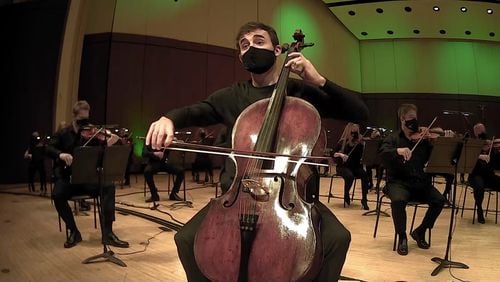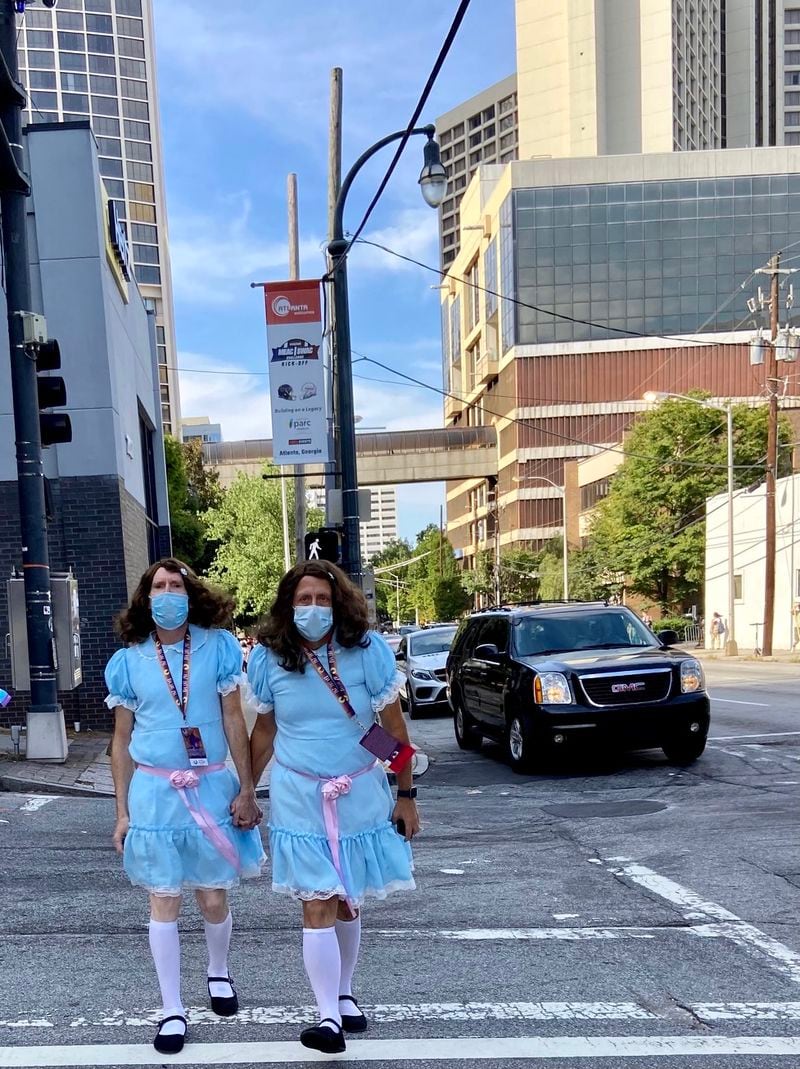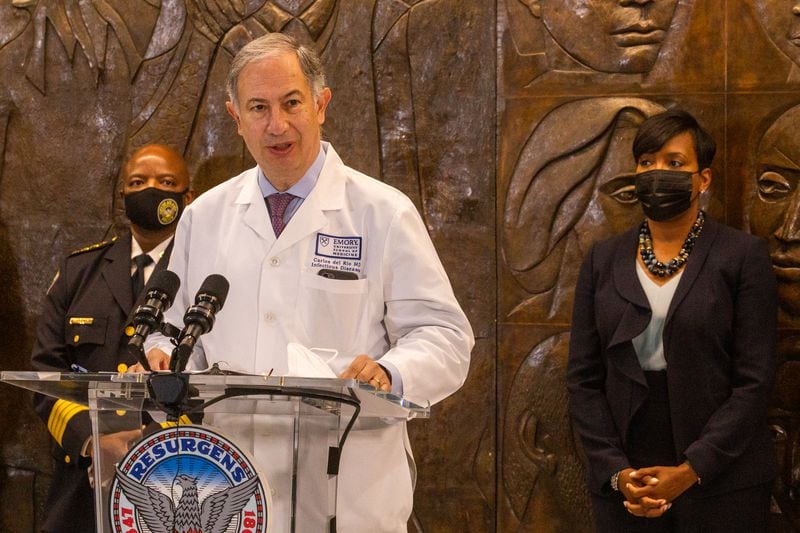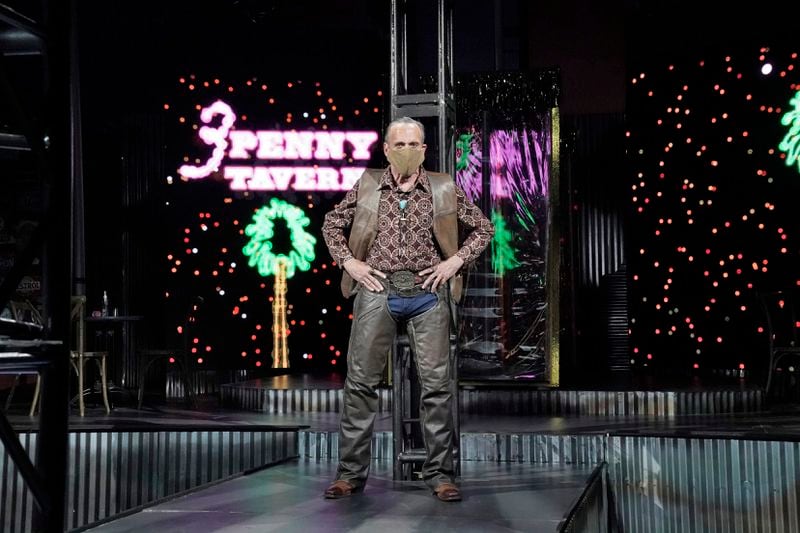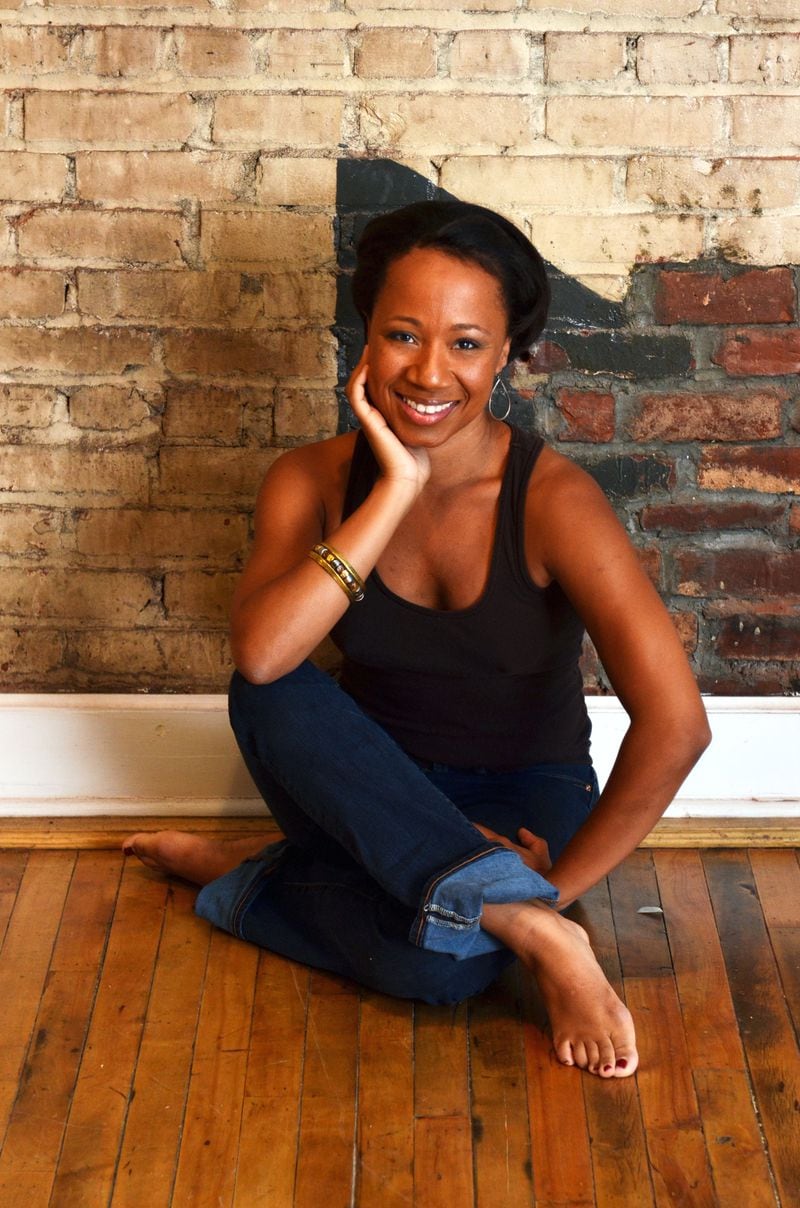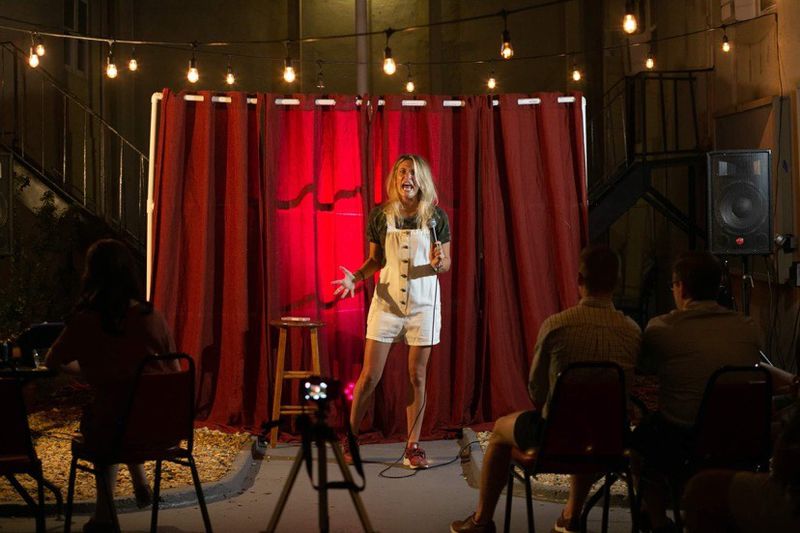Go take in a movie at the Plaza Theatre and you can now purchase a BinaxNOW COVID-19 test for $15. At Dragon Con over Labor Day weekend, more than a few attendees donned “delta variant” costumes, and cosplay at times resembled a Russian nesting doll of masks — cloth mask atop monster mask.
Meanwhile, despite obvious tie-in potential with “Hamilton’s” song “My Shot,” the Fox Theatre’s current staging of the Broadway hit requires no proof of vaccination from the audience, even as patrons are packed closer together than all the awards lining Lin-Manuel Miranda’s bookshelf.
Credit: Alexis Hauk/ArtsATL
Credit: Alexis Hauk/ArtsATL
The second autumn of pandemic across the Atlanta arts scene is at once a surreal, strange, uncertain, scary and haphazard time. The alarming resurgence of COVID-19 cases and hospitalizations, bolstered by Georgia’s low numbers of fully vaccinated people plus a highly contagious new strain, have called into question the once hopeful promise of “getting back to quasi-normal” that seemed within reach mere months ago.
Add to this the fact that mask mandates — both on paper and in terms of enforcement — vary wildly from county to county and city to city, and the way forward is anything but clear. Every arts and entertainment outing becomes a calculation that weighs the dancing or singing or acting or joke-slinging against the potential to get sick or make others sick.
In fact, on Sept. 15, with “Hamilton” patrons waiting outside the Fox in the rain, Broadway in Atlanta had to abruptly cancel that evening’s show after some company members tested positive for COVID-19. Performances resumed the next night.
Without cohesive, centralized policymaking from state officials, arts organizations have had to grapple with the question of how to safely create art for the public — a query for which there may not be one answer but instead a string of partial answers.
To help in this pursuit, the Atlanta arts community has leaned on public health experts, trends in the broader arts world, and trusted peers and colleagues. Here’s how some of this city’s leading artistic directors, dancers, comedians and public health experts have approached this seemingly forever-in-flux paradigm.
Credit: Jenni Girtman
Credit: Jenni Girtman
COVID-19 advice from public health experts
The prevailing wisdom is that as long as COVID-19 persists, every venture out among other people is a risk/benefit assessment. And while the risks have rightly received much attention, the benefits of creative expression and human connection, too, remain vital, says Dr. Carlos del Rio, who during the pandemic has advised the Atlanta Symphony Orchestra, on whose board he serves, and the Atlanta Opera.
“I think the arts are critical in this time of so much pain and suffering,” says del Rio, executive associate dean at Emory School of Medicine and Grady Health System and co-director at the Emory Center for AIDS Research. “Music improves our mental health and has an enormous power of relaxation and inspiration.”
Over the last year, del Rio has served as a link between Atlanta arts and public health. He helped the Atlanta Opera pull off its Big Tent series, where protocols included socially distanced seating, temperature checks, timed entry and performers who sang through masks or within plexiglass booths. It was one of the rare chances, from the start of the pandemic to this fall, to see live opera nationwide.
Now, as concert halls fill once more, del Rio points out that no COVID-19 safety measure is completely foolproof, but it’s a matter of minimizing the risks via evidence-based best practices. To that end, proof of vaccination or showing a negative COVID-19 test taken within the last 72 hours is a wise call, he says.
The Atlanta Opera, under del Rio’s guidance, is requiring just that. In addition, opera patrons bringing in a test result in lieu of vaccination proof must specifically show a recent negative polymerase chain reaction (PCR) test, which detects genetic material from the virus and is widely considered to be the most accurate and reliable indication of whether or not you are infected.
Credit: KenHoward
Credit: KenHoward
The revered Spivey Hall, on the other hand, is part of Clayton State University and under the policies of the University System of Georgia. Under state guidelines, Spivey Hall cannot even require patrons to wear masks, much less mandate vaccinations or recent tests.
CDC guidelines state first and foremost that everyone should get vaccinated if they can. The agency has also advised that gatherings outdoors are far safer than indoors, and that for inside events, key factors include how long it takes and the quality of ventilation in the space, along with social distancing and masks — which should be worn correctly and consistently.
“If everyone wears a mask and it stays on, that’s what matters,” says del Rio’s colleague, Dr. Susan Ray, a hospital epidemiologist for Grady Health System as well as a soprano for the Atlanta Symphony Orchestra Chorus. This means to be sure to eat and drink before you go to an event to avoid needing to move your mask out of place, she says.
“You probably shouldn’t be in a mosh pit,” Ray adds lightly. “But if you have to, you should wear a mask.”
“Cloud on the horizon” for punk band
No stranger to a masked-up mosh pit, rising Atlanta punk band Lesibu Grand couldn’t wait to get back to performing live. By early summer, each musician was fully vaccinated and ready once again to melt faces with the power of rock.
But bassist Jon Renaud and singer Tyler-Simone Molton didn’t exactly picture it going down like this: nervously playing a recent gig at a crowded house party where everyone’s vaccination status was unknown, and performing in masks to a sweaty crowd at Star Bar in Little Five Points.
Now, as the band prepares to play Afropunk Atlanta at Atlantic Station on Sept. 25, the musicians are simultaneously amped about the crowd and relieved that the festival takes place outside.
“We really haven’t booked anything since this rollback happened,” Renaud says. “Afropunk and Star Bar were booked during the ‘glory months’ when we thought it would be fine. Now there’s a bit of a cloud on the horizon. I think it’s going to be more challenging going forward.”
In the immediate, the band will keep taking it “one gig at a time,” Molton says. “All of our bandmates are on the same page. If it doesn’t seem like a safe gig or if one person doesn’t feel comfortable, we’re not going to do it. It’s always a unanimous decision.”
Facing a “judgment call”
Dance Canvas Executive Director Angela Harris says that this second year operating amid the virus has felt more complicated and challenging than last year. “When COVID first hit, it was very simple — you had to mask, you had to be distant, you couldn’t touch people, you couldn’t be in enclosed spaces.”
Credit: Courtesy of Angela Harris
Credit: Courtesy of Angela Harris
Now, with some venues attempting to implement safety guidelines sometimes contradictory to those enforced by organizations renting those spaces, she says, “With the uncertainty surrounding everything, it puts more responsibility on the judgment call.”
Harris recently choreographed the second half of “Song and Dance” at Aurora Theatre and felt relief while working within the theater’s strict COVID-19 protocols. Having clear rules in place meant she could simply focus on creating art. Essentially, by building a solid safety structure, an organization may relieve its artists from the burden of having to do so individually.
“I’m now in a place where I am more inclined to mandate the vaccines, too,” Harris says. “I put myself in a dancer’s shoes, and I don’t think I would be comfortable partnering with someone who isn’t vaccinated now because it is an intimate space, and this is still a very deadly virus. We need to make sure that there isn’t unnecessary risk-taking.”
If there’s a silver lining to this challenging period, Harris says, it may be the stamina that dancers are building up during physically exerting rehearsals and performances with masks. “I said to the dancers in “Song and Dance,” just imagine how great it’s going to feel when you get on stage without one. It’ll be a breeze.”
Three theaters, three approaches
Last year, Actor’s Express managing director Alex Scollon and his wife, Helen Baker, an assistant professor at Emory University’s Nell Hodgson Woodruff School of Nursing, spearheaded a joint effort among 18 metro performing arts organizations and a team of Emory health experts to craft customized guidelines for theaters preparing to reopen once it was safe.
Actor’s Express also stepped up as the first metro theater to announce that it would implement a vaccination or negative COVID-19 test requirement for entry to performances. Scollon says that Actor’s Express and others have made it easier for patrons to embrace such policies by readily offering alternatives if they need to move or cancel tickets.
This means that if someone forgets their vaccination card or, crucially, is experiencing COVID-like symptoms, Actor’s Express staff will “make it as easy as possible for people not to put other people at risk,” Scollon says. “We need to make sure there’s the flexibility to say stay home if you’re [feeling] sick, and we’ll be sure to get you in on a different day.”
On the opposite end of the spectrum, Marietta-based Atlanta Lyric Theatre launched its new season of musicals without publicly saying much of anything about COVID-19 protocols (the pandemic continues to be rarely noted on the company’s website). It was only when Cobb County instituted a countywide mask mandate for indoor spaces that the theater emailed ticketholders, almost apologetically, about needing to wear a mask. Then, at an opening weekend performance of “The Drowsy Chaperone,” there was no socially distanced seating and no enforcement of the new mask policy, so several members of the audience went without them for the entire show.
One performance company not riding the wave of fall reopenings is Horizon Theatre, which plans to delay its new season until early 2022.
“Our whole mantra is to come back better,” Artistic Director Lisa Adler says. “We debated starting in the fall, but ultimately over the summer, we decided, let’s use this time to get organized so that we can come out of the pandemic in the better place than we left.”
Horizon has sustained for nearly two years sans live performances thanks to a mix of supplemental income streams. In 2020, this included a PPP forgivable loan along with COVID-19 relief and recovery support from government agencies, foundations and individual donors. Over the summer, the company received a Shuttered Venue Operators Grant, with which it has been implementing COVID-19 safety upgrades to its Little Five Points performance space.
The company also has drawn from a reserve fund that Adler says was set up as “a safety net for times like these.”
For comedians, COVID-19 is far from funny
The COVID-19 period has been particularly challenging for standup comedy, an art form uniquely reliant on the laughter of a live audience, typically sitting in close quarters, to push good jokes to the top.
Credit: Alyx Libby
Credit: Alyx Libby
The long stretch without gigs has changed the local landscape altogether, with many comics simply leaving the business. “There were some people who were killing it, paying their full-time bills, which is uncommon in comedy,” comic Katherine Blanford says. “And then their whole livelihood just stopped, and it was so traumatic for them that they were like, ‘I’m not putting my eggs in that basket again.’”
Comic Shaunak Godkhindi, who produces shows at Eventide Brewery and New Realm Brewery, finds it challenging to enforce protocols while running things onstage. However, he tries to make sure that promotional materials clarify that the unvaccinated need not attend.
The pandemic also has reshaped the kind of comedy that resonates with audiences.
“I think now you feel something tighten in the room very quickly even if you just mention certain things,” Blanford says. “If you just say the word, ‘masks,’ sometimes you’ll hear people say, ‘Oooh . . .’ And you’re like, ‘I didn’t even say anything about it!’ People are happy to be out, but people are also waiting to get defensive.”
As tough as the current situation can be, the pandemic has changed Godkhindi’s attitude toward these professional pursuits. “Before, I was like, ‘Comedy is such a grind, man, it’s so lonely.’ But during COVID, that melted. My mentality started to shift from, ‘I need to do this or do that’ to ‘Oh, I get to do that.’ So, my gratitude went up tenfold. I’m happy just to do any show because it was almost gone forever.”
Credit: ArtsATL
Credit: ArtsATL
Working closely with the American Press Institute, The Atlanta Journal-Constitution is embarking on an experiment to identify, nurture and expand a network of news partnerships across metro Atlanta and the state.
Our newest partner, ArtsATL (www.artsatl.org), is a nonprofit organization that plays a critical role in educating and informing audiences about metro Atlanta’s arts and culture. Founded in 2009, ArtsATL’s goal is to help build a sustainable arts community contributing to the economic and cultural health of the city.
Over the next several weeks, we’ll be introducing more partners, and we’d love to hear your feedback.
You can reach Managing Editor Mark A. Waligore via email at mark.waligore@ajc.com.
